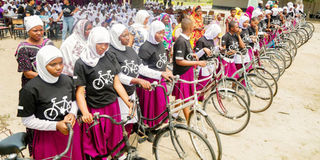Bikes enable schoolgirls to continue with education

Bagamoyo’s secondary school students are reaping the benefits of the One Girl, One Bike project, aimed at providing them with bicycles to significantly cut down travel distances to and from school. PHOTO | COURTESY
What you need to know:
- Parents and guardians of some students have been purchasing bicycles for teen girls to use as a medium of transport to and from school.
Bagamoyo. Sophia Miraji, 14, a Form Two student at Nianjema Secondary School in Bagamoyo District, Coast Region, had begun giving up on continuing studies due to the long distance between her home and school.
A similar experience was faced by Rosemary Muta, 15, a pupil at Kilomo Primary School, and hundreds of thousands of secondary school girls across the country.
They are forced to go for alternatives, including renting houses near schools for accommodation, due to a lack of dormitories and hostels.
Parents and guardians of some other students have been purchasing bicycles for teen girls to use as a medium of transport to and from school.
Speaking to The Citizen on Friday, Sophia and Rosemary said navigating tiresome journeys of up to 10 kilometres daily led to not only physical exhaustion but also gloomy threats of harassment and violence.
To Sophia, the transportation issue was a barrier to her educational aspirations. “I usually return home very tired. At home, I was also restless because of housework,” she told The Citizen.
Eventually, she started missing classes.
Bodaboda drivers, who played a role in their daily commute, turned out to be another significant threat of harassment and violence.
Rosemary recounted how she once escaped a rape attempt from a boda boda operator who used to pick her up every day and who she took for a brother.
“One day he proposed sex with me, and when I refused, he wanted to rape me,” she narrates.
Such circumstances are what prompted interventions from the Msichana Initiative, a non-governmental organisation dedicated to advocating for girls’ rights to education.
Through the ‘One Girl, One Bike’ project, implemented in collaboration with the Karimjee Jivanjee Foundation, the Msichana Initiative has provided bicycles to schoolgirls living long distances from schools.
“When I heard of the help, I didn’t want to stay at home anymore,” she say.
Fortunately, she was among those who were given a bicycle that encouraged her and reignited her dream of acquiring better performance.
The ‘One Girl Plus’ is another project implemented by the Msichana Initiative focusing on empowering girls through sexual reproductive health education, using creative card games to strengthen their confidence and self-awareness.
Ms Bertha Ismael, a teacher at Nianjema Secondary School, declared the initiative’s positive impact, saying it goes beyond the classroom to help girls resist different challenges hindering education and prosperity.
Msichana Initiative project manager Furahini Michael insisted on the importance of life skills education, calling for the government’s and stakeholders’ support.
The One Girl Plus project has reached over 1000 secondary school girls in Bagamoyo District, equipping them with tools that enable them to navigate daily challenges.
Msichana Initiative executive director Rebecca Gyumi recognises the One Girl, One Bike campaign’s transformative potential.
The initiative has donated bicycles to secondary school girls in two regions, improving attendance among beneficiaries by 70 percent and bringing positive effects to the community.
Ms Gyumi emphasises the initiative’s crucial role in promoting equality, underscoring the need for sustained efforts to overcome multifaceted barriers hindering education achievement among girls.
Mr Ramadhani Hassan, a parent of a student at Nianjema Secondary School, says the institution’s support has raised self-esteem among the girls.
“The provision of bicycles has become a stepping stone towards a brighter future for young learners,” he noted.





